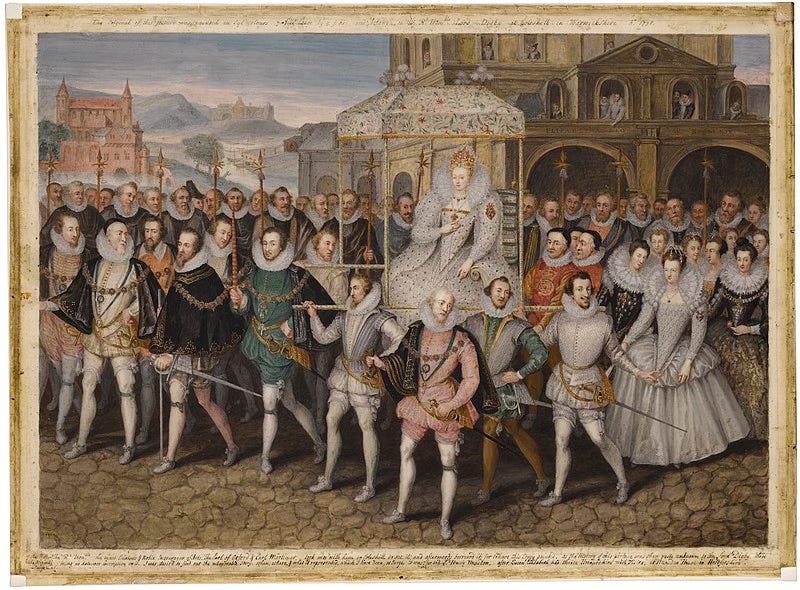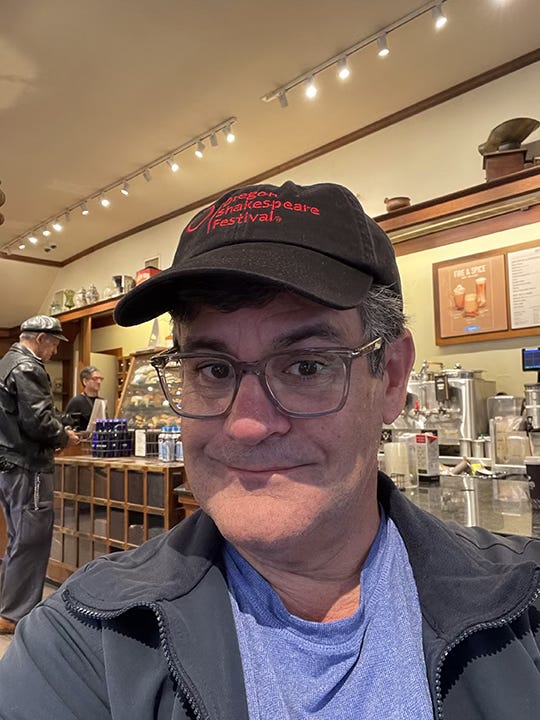Experience Stacks and Travel Back
Returning to places you've been can reactivate old contexts and relationships in a special way. (Issue #136)
Hi there! This has been the not-very-weekly Dispatch lately, since I haven't written since "My Ozempic Journey: Packing Up" on September 15. My apologies. I knew ahead of time that I wouldn't be able to write on September 22 because I was in transit, driving from Portland down to an exciting week of conferences with Ascendant Network in Palo Alto. Then, heading back north on September 29, I was caught between writing and the twin pleasures of seeing Macbeth at the Oregon Shakespeare Festival in Ashland Saturday night and visiting with my son William in Eugene (where he is at the University of Oregon) on Sunday. As it happens, my journey there and back again is what I'll talk about below.
However, before we get to today's main topic, some miscellaneous goodies and things worth your attention…
Comedy can come from surprising places: this NYT Wirecutter review of a spray to make cleaning your toilet easier made me laugh out loud.
The Project 2025 Song is an amazing, Schoolhouse Rock-style explanation of the Republican transition plan created by The Heritage Foundation and embraced by the GOP candidates (no matter how much they now try to deny it). You'll get an alarming overview in four and a half minutes.
As I've shared before, my #1 political issue is reproductive freedom. Even if you're against abortion you should read this dispiriting article from The Atlantic about what abortion bans in Idaho have done to women and doctors.
The Content Marketing Institute included an interview with me (in my science fiction novelist / futurist capacity) in an article about "proactive trendspotting."
Last weekend's episode of "The Interview" podcast from NYT features John Oliver: it's both fascinating and funny.
Everything you need to know about the Google Ad Tech Antitrust trial: Whenever my friend Terry Kawaja texts me a new post, I wonder which Terry I'll get: the smartest M&A banker in digital media or the hilarious comedian. In this insightful and funny YouTube video, I got both.
Smartless fans rejoice! NYT has a long and enjoyable article about the genesis, present, and future of the popular podcast.
Practical Matters:
Sponsor this newsletter! Let other Dispatch readers know what your business does and why they should work with you. (Reach out here or just hit reply.)
Hire me to speak at your event! Get a sample of what I'm like onstage here.
The idea and opinions that I express here in The Dispatch are solely my own: they do not reflect the views of my employer, my consulting clients, or any of the organizations I advise.
Please follow me on Bluesky, Instagram, LinkedIn, Post and Threads (but not X) for between-issue insights and updates.
A quick word about Experience Stacks before we move on to our top story. Experience Stacks are the different contexts that a customer, user, or audience brings to a product or story. People improvisationally shift from context to context during experiences, which is one of the key differences between analog (human) thinking and algorithmic (AI) thinking. That's all you need to know about Experience Stacks to understand this article, but you can dig into all my pieces on this topic if the spirit moves.
Experience Stacks and Travel Back
I love traveling to new places. Time thickens and slows. The pleasant labor of orientation and deduction ("is that the path to the beach or are we turned around?") can make an overnight feel like days away. A new location also helps you measure and appreciate home once you pull up to your front door.
But I also love going back to places I used to know well to see the people who still live there and chart the distance between then and now, between who we were and who we are, and with a pinch of who we hope to be.
In my prior writing about Experience Stacks, one thing I haven't explored is that you have to reactivate experiences in order to have access to them. Proust and his madeleines are all well and good, but most people need to dwell inside memories for a while to nudge them awake.
In Elizabethan England, the Queen would make yearly "progresses" or "public processions" in which she traveled with an immense retinue to different parts of her kingdom, there to bestow on various of her aristocratic subjects the great honor and massive expense of being her host. The double purpose of these progresses was to defray some of the cost of her court and to reinscribe her authority over her dominion. The progresses were a political statement: "I'm still here. I'm still the boss, and don't you forget it."
Without those progresses, Elizabeth's power might have atrophied. In his frustrating and brilliant book, The Practice of Everyday Life, Michel de Certeau talks about a similar phenomenon: how street names "slowly lose, like worn coins, the value engraved on them, but their ability to signify outlives its first definition" (104). This is a mind-bogglingly dense way of saying, "how often do you think of Dr. King when you make a right on Martin Luther King, Jr. Boulevard in your hometown?" The memory that the street name first celebrated wears away in routine navigation until it's just "MLK Blvd."
Growing up in L.A., I had no idea that "Victory Boulevard" was about winning WWII until I was in my 20s, and I had driven that street (my high school girlfriend lived near there) numberless times.
The catalyst for my decision to drive 700 miles from Portland to Palo Alto, rather than hopping on a quick flight, was to spend time with my friend Flossie Lewis.
Flossie is remarkable. After a celebrated career as an English teacher at Lowell High School in San Francisco, she retired and decided to go back to graduate school to get her Ph.D. at U.C. Berkeley. That's where we met. Another grad student, Kate Levin, was directing a production of an obscure Jacobean play, Women Beware Women, and Flossie and I were both in it. She was playing a male character, and after one scene she asked me how she was doing. "You're doing the lines fine," I replied, "but you don't know how to walk like a man." Her face exploded into a smile, and she demanded that I teach her how to walk like a man right then and there.
At that time, the English Ph.D. program at Berkeley did nothing to prepare grad students to teach: the focus was entirely on research. I wanted to be a good teacher, and Flossie clearly knew everything there is to know about a classroom, so I asked her if I could be her T.A. the next semester. We had a ball, and I learned a lot.
Flossie and her husband Jerry and La Profesora and I also double dated (when La Profesora and I were not yet married). In a sunlit cafe on a spring afternoon, Jerry, who was a remarkable photographer and musician, took my favorite picture of my future wife from the start of our journey together: meditative, looking off in the distance, a decorative scarf around her neck, and a small smile. A couple years after that, Jerry took ill and died, and we tried to be there for Flossie during that dark time.
On July 8 of this year, Flossie turned 100. Shortly after that, when I was helping my daughter Helena move back down to L.A. from Portland, we stopped to see Flossie, but we only had a few minutes, so I promised to return soon for a proper visit.
Six weeks later, I met Flossie in the lobby of Piedmont Gardens in Oakland, where she has lived for the last few years. She is now wheelchair bound. Her eyesight is not great nor is her hearing, but she is as sharp as she ever was. (When Helena and I were there in August, she had choice things to say about JD Vance.)
I pushed her wheelchair to a nearby restaurant, where we had a long brunch, talking a mile a minute the whole time. The patient woman who served us then took this picture:
At the end, Flossie informed me that I must come back in November. "I'm going to be all over the planet in November, Flossie," I replied. "How's December?"
"December is good," she said. "I think I have a year left."
La Profesora and I are already making plans.
Although seeing Flossie was the first reason I decided to drive, it wasn't the only one—and it wasn't the only reactivation of different experience stacks.
After La Profesora and I moved William into his new apartment in Eugene, I kept going south to Ashland. The next day, I worked from early in the morning until the afternoon matinee of an interesting all-female Coriolanus at the Oregon Shakespeare Festival. Then I returned to work until a performance that night of Much Ado About Nothing—that was an experiential reactivation.
Decades ago, at the same theater, watching a different production of the same play, I noticed something odd about the comedy: it explicitly and implicitly quotes Romeo and Juliet, a tragedy, many times. That insight became the thread of my doctoral dissertation and planted the seed of what I now call Experience Stacks, which inform just about everything I think about narrative and experience—improvisational, non-linear, and both analog and analogical.
I spent one night in Davis and had dinner with Cyn and Jane, also friends from grad school days. After seeing Flossie, I visited with Tameka in San Lorenzo, a longtime industry friend and colleague whom I hadn't seen since a CES some years back. The Ascendant Network meetings were chock full of industry people, some of whom I've known for 20 years, and some new friends. My new role with Ascendant inflected those interactions in different and productive ways. Plus, many people there read this newsletter, and several asked how Ozempic was going. (Answer: it hadn't started yet)
On my way back north, I crashed for a night with Chris and Molly, whom I hadn't seen in many years. Chris reads The Dispatch, which had sparked us to start corresponding, and then prompted his invitation to stay in their adult child David's old room. I haven't met David yet, but I had the remarkable opportunity to attempt a psychological profile based on the contents of their room. It contained nearly geological layers from David's entire life, so I doubt I got much right.
My trip reactivated dozens of Experience Stacks, some like what I've shared and some almost too small to describe, like this one:
I took this selfie at the original Peet's Coffee at Walnut and Vine in Berkeley and sent it to La Profesora because that was one of our hangouts when she lived in an apartment steps away.
Now that I've returned to day-to-day life at home, these contexts are settling back into memory, although refreshed with new exposures. My life is richer because of the revisitations of my trip. I'm a lucky guy.
Thanks for reading. See you next Sunday. (Honest!)
* About the image: I used Adobe Photoshop's fascinating "Generative Fill" technology to remove two unsightly cups and saucers from the picture with Flossie.



